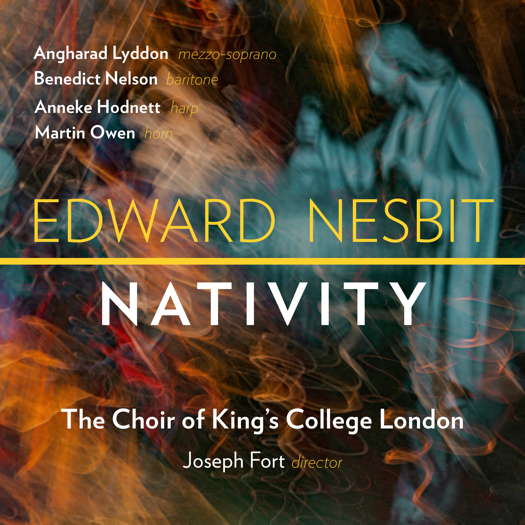- Donatella Flick LSO Conducting Competition
- Klezmer
- Xavier Montsalvatge
- Verdi: Ernani
- microtonal music
- Peter King
- Robert Pearsall
- Bliss: Metamorphic Variations
PROVOCATIVE THOUGHTS: 
The late Patric Standford may have written these short pieces deliberately to provoke our feedback. If so, his success is reflected in the rich range of readers' comments appearing at the foot of most of the pages.
 DISCUSSION: What is a work? John Dante Prevedini leads a discussion about The performing artist as co-creator, including contributions from Halida Dinova, Yekaterina Lebedeva, Béla Hartmann, David Arditti and Stephen Francis Vasta.
DISCUSSION: What is a work? John Dante Prevedini leads a discussion about The performing artist as co-creator, including contributions from Halida Dinova, Yekaterina Lebedeva, Béla Hartmann, David Arditti and Stephen Francis Vasta.

Beauty and Simplicity
KEITH BRAMICH is attracted to Edward Nesbit's 'Nativity'
'... the more I listen, the more I like it.'
This new album is doing for me what we perhaps all need at this time of year - bringing back the wonder of the Christian manger birth in a different way and removing the cliché of tired and often repeated settings of the Christmas story. It's different - a very unusual take on the Nativity, in terms of both the recently composed music and the ancient words set - and sometimes slightly on the weird side. It's also doing this with attractive, unusual and economic forces - two vocal soloists in the first work, mixed choir and sometimes horn and harp.
The disc contains five distinct Christmas-themed works by British composer Edward Nesbit, whose settings here, for me, have something of the beauty and simplicity of the music of Britten. Four of these works form the album's major sections, each of which is separated by a solo harp work, expertly played here by Anneke Hodnett. The three harp pieces together form a fifth work, Drop down, ye heavens.
The album begins with the title work, Nativity, which sets anonymous texts from the Tilethatchers Play in the York Corpus Christi cycle, and by the Welsh metaphysical poet Henry Vaughan (1621-1695) to tell the Nativity story in an intriguingly different way. Nesbit's horn writing, attractively interpreted here by Martin Owen, is quite distinctive, and the opening chorus, setting Henry Vaughan, sounds a bit like a hunting song:
So stick up ivy and the bays,
And then restore the heathen ways.
Green will remind you of the spring,
Though this great day denies the thing.
And mortifies the earth and all
But your wild revels, and loose hall.
Listen — Edward Nesbit: So stick up ivy and the bays (Nativity)
(DCD34267 track 1, 0:00-0:48) ℗ 2024 Delphian Records Ltd :
Nativity also has an unusual structure, consisting of chorus, recitative, scherzo, lullaby, then another of each of these sections followed by a final chorus, in which the horn writing is again unusual, with its long repeated notes and sometimes cheeky asides, muted in one short section. Using low voices for the solo parts - here mezzo Angharad Lyddon and baritone Benedict Nelson - gives the work extra gravitas. The choice of instruments - french horn and harp - is also very significant, as they are highly contrasting and used in a way that strongly reinforces how the music here resonates with its ancient texts.
The composer's fascinating and extensive liner notes show that all the music here has been very carefully researched, planned and implemented, and he points to many connections and references, to a wealth of detail and to the humour in some of the writing. He also notes that there's faster music here than in much modern choral writing, which is true, although I don't particularly notice this, apart from the increased sense of drama.
Listen — Edward Nesbit: Say, Mary daughter, what cheer with thee? (Nativity)
(DCD34267 track 7, 0:00-0:54) ℗ 2024 Delphian Records Ltd :
After the meditative Be not wroth very sore, the first Drop down, ye heavens harp solo, the album moves on to seven Wycliffe Carols settings. Here, and for the subsequent choral works, the excellent and committed Choir of King's College London is singing a cappella. Again these tell the story of the Nativity, but using slightly quirky texts from the first complete translation of the Bible into English, by a late fourteenth century team led by John Wycliffe, instead of the King James Bible texts used by Handel for Part 1 of Messiah. So, for example, instead of Handel's Comfort Ye, here we have My people, be ye comforted, be ye comforted, saith your Lord God.
Listen — Edward Nesbit: Be ye comforted (Wycliffe Carols)
(DCD34267 track 11, 0:00-0:32) ℗ 2024 Delphian Records Ltd :
We have sinned, the second (and more lively) Drop down, ye heavens harp solo, marks the transition to the two contrasting Metaphysical Songs, 'Awake, glad heart!' and 'The Shepherds', where Nesbit returns to words by Henry Vaughan.
Listen — Edward Nesbit: Awake, glad heart! (Metaphysical Songs)
(DCD34267 track 19, 1:12-2:09) ℗ 2024 Delphian Records Ltd :
The last Drop down, ye heavens harp solo has the title Comfort ye. Surprisingly, this one is fast, joyful and rather like a perpetuum mobile. Edward Nesbit explains in his notes that these three solos are loosely based on the seventeenth century hymn the Advent Prose.
Listen — Edward Nesbit: Comfort ye (Drop down, ye heavens)
(DCD34267 track 21, 1:01-1:41) ℗ 2024 Delphian Records Ltd :
Completing the album are Four Christmas Lyrics setting words in (or slightly later than) Middle English.
Listen — Edward Nesbit: Abowt the fyld thei pyped full right
(Four Christmas Lyrics)
(DCD34267 track 25, 2:01-2:49) ℗ 2024 Delphian Records Ltd :
Is there anything negative to say here? Only that, at least in the album's digital version provided for review, biographies of everyone involved except the composer are included in the booklet, and for me that's quite an omission. I could only pick up a small amount of biographical information from the 'Also available on Delphian' section at the end of the booklet. For the record, British composer Edward Nesbit, born in 1986, was a chorister when young, studied at Malvern College, Cambridge University, Guildhall School of Music and Drama and at King's College London, where he now teaches composition, so he's a colleague of Joseph Fort, the conductor on this disc. His composition teachers included Adrian Williams, Julian Anderson and George Benjamin.
I'm attracted to the music on this album, and the more I listen, the more I like it.
Copyright © 19 December 2024
Keith Bramich,
Herefordshire, UK



